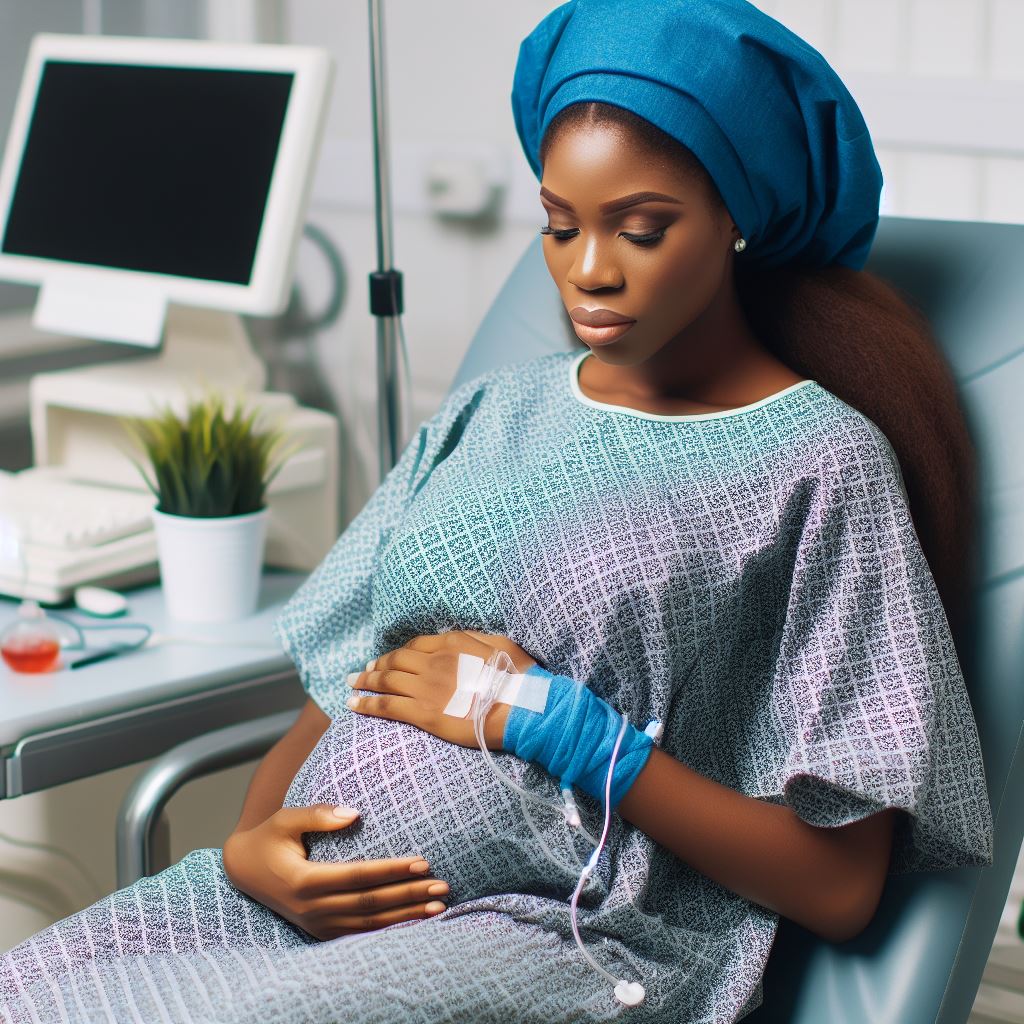Introduction
In this blog post, we will explore how a Week Baby Bones Harden.
The 33rd week of pregnancy brings about several significant changes in a baby’s development.
One of the most crucial developments during this stage is the hardening of the baby’s bones.
This process is known as ossification and plays a vital role in the overall growth and well-being of the baby.
Bones provide the structural framework for the human body, and during pregnancy, they contribute to the baby’s growth and protection.
As the bones harden, they become stronger, which prepares the baby for life outside the womb.
This enables the baby to support their bodyweight and move with greater ease.
The hardening of bones is made possible by the deposition of minerals, particularly calcium and phosphorous, which give strength and rigidity to the bone structure.
These minerals are sourced from the mother’s diet as well as from her bones.
Adequate intake of calcium-rich foods such as dairy products, leafy greens, and fortified cereals can ensure a sufficient supply of these minerals.
Furthermore, the hardening of bones also supports the baby’s vital organs and protects them from potential harm.
As the baby continues to grow, their skeletal system helps to safeguard delicate organs like the heart, lungs, and brain.
In essence, the 33rd week of pregnancy is a significant time as the baby’s bones begin to harden.
This developmental milestone is crucial for the baby’s growth, mobility, and protection, emphasizing the importance of a healthy diet rich in calcium for both the mother and the baby.
The stage prepares the baby for life after birth, enabling them to support their bodyweight and move freely.
Parenting Made Just for You
Get personalized Parenting Solutions tailored to your child’s needs. Transform your parenting journey with expert guidance in 1-3 days.
Get StartedDevelopment of baby’s bones
How bones form in the womb
In the womb, bones begin to form through a process called ossification, where cartilage gradually turns into bone.
Osteoblasts, specialized cells, deposit minerals such as calcium and phosphorus onto the cartilage, transforming it into solid bone tissue.
During the first trimester, the basic shape of the skeleton is created, and by the end of the second trimester, all major bones are present.
However, bones continue to grow and develop even after birth, adapting to the needs of the growing baby.
Factors contributing to the hardening of bones
Calcium absorption
Calcium is a crucial mineral for bone health, and during pregnancy, the body increases its absorption of calcium from the diet.
This increased absorption helps provide the necessary calcium for the formation and hardening of the baby’s bones.
Vitamin D synthesis
Vitamin D plays a vital role in calcium absorption, as it facilitates the transport of calcium into the bones.
During pregnancy, the body increases the production of vitamin D to ensure sufficient calcium for the baby’s bone development.
Hormonal changes
Hormones like estrogen and progesterone, produced in higher levels during pregnancy, contribute to the hardening of the baby’s bones.
These hormones stimulate bone-building cells and help enhance bone density.
Role of the skeleton in protecting organs and supporting the body
The skeleton serves as a protective framework, shielding the delicate organs of the baby from external forces.
It acts as a shield for organs like the brain, heart, lungs, and abdomen, keeping them safe and secure within the developing body.
Additionally, the skeletal system provides support, allowing the baby to move and explore their environment as they grow.
It provides a sturdy framework for muscles to attach to, enabling various movements and actions.
Unveil the Perfect Name that Tells Your Family's Story
Let us help you find a name that embodies your family's values, traditions, and dreams. Our personalized consultation weaves cultural insights to create a name that's uniquely yours.
Get StartedWithout a well-developed skeleton, the baby’s body would lack the necessary support and protection required for healthy growth.
Read: Week 32: Monitoring Baby’s Growth
Signs and Symptoms of Baby’s Bone Hardening
Increased Movement and Activity Felt by the Mother
One of the signs that indicate the baby’s bones are hardening is the increased movement and activity felt by the mother.
As the bones grow stronger, the baby becomes more active and frequently kicks, punches, and rolls inside the womb.
This heightened level of movement can be a delightful and reassuring experience for expectant mothers.
Appearance of Visible Limbs and Features on Ultrasound
Another significant sign of baby’s bone hardening is the appearance of visible limbs and features on an ultrasound.
During this stage, the bones are becoming dense and solid, which allows them to be clearly seen on the ultrasound images.
Expectant mothers can witness the development of their baby’s tiny fingers, toes, arms, and legs, which become more defined as the bones strengthen.
Baby’s Ability to Grasp and Squeeze Objects in the Womb
As the baby’s bones continue to harden, a notable symptom is their growing ability to grasp and squeeze objects in the womb.
This development is possible due to the strengthening of their muscles and bones, enabling them to obtain a firmer grip.
It is an exciting revelation for mothers to feel their little ones holding onto their fingers or the umbilical cord during ultrasound examinations.
In fact, the signs and symptoms of baby’s bone hardening serve as an indication of the remarkable progress taking place inside the womb.
The increased movement and activity felt by the mother, the appearance of visible limbs and features on ultrasound, and the baby’s ability to grasp and squeeze objects all signify the growth and strength of their skeletal system.
These developments offer expectant parents an intimate glimpse into the incredible journey of their baby’s intrauterine development.
Read: Week 31: Baby’s Five Senses Develop
Nutritional requirements for bone development
Importance of calcium-rich foods in the mother’s diet
The proper intake of these nutrients is crucial for the development of the baby’s bones during pregnancy.
Calcium plays a vital role in the structural formation of the skeletal system. It is responsible for ensuring the strength, density, and proper growth of bones.
Calcium is essential for the development of the baby’s bones.
The mother should consume foods like milk, yogurt, and cheese to meet her calcium needs.
Recommended daily intake of calcium during pregnancy
It is recommended for pregnant women to consume 1000-1300 mg of calcium per day.
This can be achieved through a balanced diet that includes dairy products, leafy greens, and fortified foods.
The mother’s diet should include calcium-rich foods to ensure an adequate supply of this nutrient.
Dairy products such as milk, yogurt, and cheese are excellent sources of calcium. They provide both calcium and Vitamin D, which aids in calcium absorption.
Other essential nutrients for strong bones
In addition to calcium, other nutrients also contribute to bone health. Vitamin D is necessary for the body to absorb and utilize calcium effectively.
Sun exposure is a natural way to obtain Vitamin D, but it can also be obtained from fortified milk and fatty fish.
Magnesium is another essential nutrient for bone development. It plays a role in calcium metabolism and bone formation.
Including foods like nuts, seeds, whole grains, and legumes in the diet can help meet the magnesium requirements.
Phosphorus works in collaboration with calcium to strengthen bones and teeth.
It is found in various foods such as meat, fish, dairy products, and whole grains. Consuming a balanced diet with these food sources can ensure an adequate intake of phosphorus.
It is important for pregnant women to pay attention to their nutritional intake, especially regarding bone development.
Following a well-balanced diet that includes calcium-rich foods, along with other essential nutrients like Vitamin D, magnesium, and phosphorus, is necessary for the baby’s bone health.
Consulting a healthcare professional or a registered dietitian can provide personalized guidance on meeting the specific nutritional needs during pregnancy, including the requirements for optimal bone development.
Read: Week 30: Baby’s Brain Develops Rapidly

Activities to Promote Healthy Bone Development
Safe Exercises for Pregnant Women
- Engaging in regular physical activity during pregnancy can help promote healthy bone development for the baby.
- Low-impact exercises like walking, swimming, and prenatal yoga are safe options for pregnant women.
- These exercises help improve circulation, strengthen muscles, and maintain proper weight, all of which contribute to bone health.
- It is important to consult with a healthcare provider before starting any exercise routine during pregnancy.
- Exercise sessions should be moderate in intensity and avoid activities that may pose a risk of falls or abdominal trauma.
Adequate Exposure to Sunlight for Vitamin D Synthesis
- Vitamin D plays a crucial role in the absorption of calcium and phosphorus, essential for bone development.
- A sufficient amount of vitamin D can be obtained through exposure to sunlight.
- Exposing the skin to sunlight for about 10-15 minutes a day can help the body synthesize vitamin D.
- It is important to note that excessive sun exposure can increase the risk of skin damage and should be avoided.
- If sunlight exposure is limited, dietary sources and vitamin D supplements should be discussed with a healthcare provider.
Importance of Maintaining a Balanced Diet Throughout Pregnancy
- A well-balanced diet rich in essential nutrients is vital for healthy bone development in the baby.
- Calcium, phosphorus, vitamin D, and other micronutrients contribute to the formation and strengthening of bones.
- Pregnant women should include dairy products, leafy greens, nuts, seeds, and fortified foods in their daily meals to meet these requirements.
- Supplements may be recommended if there is a deficiency or difficulty in meeting the nutritional needs.
- Avoiding unhealthy habits like smoking and excessive alcohol consumption is also essential for optimal bone development.
In general, promoting healthy bone development during pregnancy is crucial for the baby’s long-term skeletal health.
Engaging in safe exercises, ensuring adequate sunlight exposure, and maintaining a balanced diet are key factors in achieving this goal.
Consulting with healthcare providers for personalized advice and guidance is always recommended to ensure the well-being of both mother and baby.
Read: Week 29: Discussing Birth Plans
Tips for Maternal Bone Health during Pregnancy
A healthy bone development is crucial for both the mother and the baby during pregnancy.
As the baby’s bones become stronger in week 33, it is essential for expectant mothers to take care of their own bone health as well.
Here are some tips to ensure optimal maternal bone health:
Adequate hydration
- Drink plenty of water throughout the day to ensure proper hydration.
- Water is essential for the absorption of nutrients, including calcium, which is vital for bone health.
- Aim to drink at least 8-10 glasses of water daily.
Regular prenatal check-ups for monitoring bone development
- Attend all scheduled prenatal check-ups to monitor the development of both the baby and the mother’s health.
- These check-ups include tests to evaluate bone density and identify any potential issues.
- Follow healthcare provider’s recommendations for prenatal vitamins and supplements for strong bones.
Avoidance of smoking and alcohol consumption
- Avoid smoking and second-hand smoke as they can negatively impact bone health.
- Smoking reduces calcium absorption, which weakens the bones.
- Avoid alcohol consumption as excessive alcohol intake can decrease bone density.
It is crucial to follow these tips to optimize bone health and ensure a healthy pregnancy. Remember, caring for your bones means caring for your baby’s bones too!
Conclusion
Recap of the importance of baby’s bone hardening
Throughout week 33, it is crucial to highlight the significance of baby’s bone hardening process.
As the bones strengthen, the overall growth and development of the baby are positively impacted.
Adequate bone mineralization ensures a healthy foundation for their future.
Encouragement for expectant mothers to prioritize their own bone health
Expectant mothers must understand that their bone health is just as vital as their baby’s.
Proper nutrition, regular exercise, and sufficient intake of calcium and vitamin D ensure strong bones for both the mother and the baby.
Taking care of oneself is essential for a healthy pregnancy.
Final thoughts and tips for a healthy pregnancy at week 33
Week 33 is a critical phase in the baby’s bone development journey.
Providing essential nutrients, engaging in safe physical activities like walking or swimming, and focusing on personal bone health will greatly contribute to a successful pregnancy.
Stay motivated, take care of your body, and enjoy this beautiful stage of motherhood!




